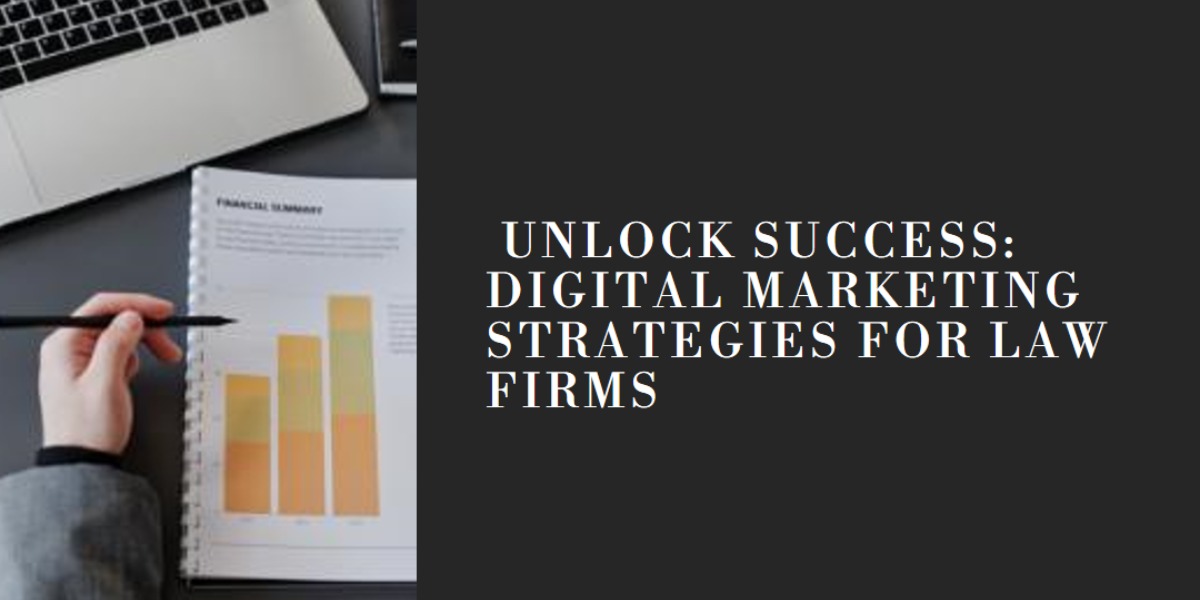I. Introduction to Digital Marketing for Law Firms
Digital Marketing has become an indispensable tool for law firms navigating the complexities of the legal industry. In this section, we’ll delve into the significance of law firm online marketing tactics in the legal landscape and the challenges faced by law firms in the digital age.
A. Importance of Digital Marketing in the Legal Industry
In an era where online visibility is synonymous with credibility, law firms can no longer afford to neglect digital marketing. Implementing robust strategies ensures that firms can reach a broader audience, establish authority, and stay ahead in a competitive market.
B. Key Challenges Faced by Law Firms in the Digital Age
Digital transformation comes with its unique set of challenges. From increased competition to evolving client expectations, law firms need to navigate these obstacles strategically. This section will explore the common challenges faced and how effective digital marketing strategies for law firms can address them.
II. Understanding Your Target Audience
Understanding the audience is the foundation of any successful digital marketing campaign. This section will guide law firms in identifying their ideal client persona and analyzing client behavior and preferences online.
A. Identifying the Ideal Client Persona for Law Firms
Creating an ideal client persona involves a deep understanding of demographics, legal needs, and online behavior. Tailoring law firm online marketing tactics to resonate with this persona ensures that the right message reaches the right audience.
B. Analyzing Client Behavior and Preferences Online
Examining how potential clients search for legal services online is crucial. This involves utilizing legal marketing techniques to decipher keywords, platforms, and content preferences, ensuring law firms align their strategies with client expectations.
III. Building a Professional Law Firm Website
A well-designed website is the cornerstone of a law firm’s online presence. This section will delve into the essential elements of a user-friendly law firm website and the importance of mobile optimization.
A. Essential Elements of a User-Friendly Law Firm Website
A professional website should not only convey expertise but also offer a seamless user experience. This involves incorporating clear messaging, intuitive design, and strategically placed calls-to-action.
B. Importance of Mobile Optimization and Responsiveness
In an era dominated by mobile users, optimizing for mobile responsiveness is non-negotiable. Ensuring that a website functions seamlessly across various devices enhances accessibility and user satisfaction.
IV. Content Marketing Strategies for Law Firms
Compelling law firm content marketing ideas is a powerful tool for law firms looking to engage and inform their audience. This section will explore the creation of legal content through blogs, articles, and guides, as well as the use of video marketing.
A. Creating Compelling Legal Content: Blogs, Articles, and Guides
Quality content not only attracts potential clients but also establishes a law firm as an authoritative source in its field. Regularly publishing informative and engaging blog posts, articles, and guides contributes to building credibility.
B. Leveraging Video Marketing: Webinars, Q&A Sessions, and Client Testimonials
Video marketing adds a dynamic element to content strategies. Hosting webinars, conducting Q&A sessions, and featuring client testimonials through videos humanizes the firm and establishes a deeper connection with the audience.
V. Search Engine Optimization (SEO) for Law Firms
Ensuring high visibility on search engines is paramount for law firms. This section will delve into both on-page and off-page law firm SEO strategies.
A. On-Page SEO Techniques: Optimizing Titles, Meta Descriptions, and Headers
Strategic placement of primary and secondary keywords in titles, meta descriptions, and headers is essential for on-page SEO. This ensures that search engines recognize the relevance of a law firm’s content.
B. Off-Page Law Firm SEO Strategies: Link Building, Guest Posting, and Online Directories
Building the online authority of a law firm involves off-page SEO. This section will explore link-building strategies, the benefits of guest posting, and the importance of being listed in online directories.
VI. Pay-Per-Click (PPC) Advertising for Law Firms
Paid advertising, particularly through Google Ads, can complement organic strategies. This section will guide law firms in understanding and implementing effective PPC campaigns.
A. Understanding Google Ads: Setting Up Campaigns and Ad Groups
Strategically setting up Google Ads campaigns and ad groups involves meticulous keyword selection, ad copy creation, and budget allocation. This ensures that law firms maximize the impact of PPC advertising.
B. Budgeting and Bidding Strategies for Cost-Effective PPC Campaigns
Optimizing budget allocation and bidding strategies is crucial for cost-effective PPC campaigns. This section will provide insights into managing budgets, adjusting bids, and monitoring the performance of PPC ads.
VII. Social Media Marketing for Attorneys
Social media platforms offer a unique avenue for law firms to connect with their audience. This section will explore the selection of the right platforms and crafting engaging social media posts.
A. Choosing the Right Social Media Platforms: Facebook, LinkedIn, Twitter, and Instagram
Different social media platforms cater to distinct audiences. Understanding the demographics and preferences of each platform is essential for law firms to choose the right channels for their target audience.
B. Crafting Engaging Social Media Posts: Updates, Infographics, and Case Studies
Engaging social media posts play a crucial role in building brand awareness. Whether it’s regular updates, visually appealing infographics, or compelling case studies, law firms can use social media to showcase their expertise.
VIII. Email Marketing Best Practices
Building and nurturing relationships with clients and leads is vital. This section will cover the best practices for law firm online promotion through building an email list and designing effective email campaigns.
A. Building a Quality Email List: Subscribers, Clients, and Leads
An email list comprising interested subscribers, existing clients, and potential leads is a valuable asset for law firms. This involves ethical and transparent methods of collecting and maintaining contact information.
B. Designing Effective Email Campaigns: Newsletters, Updates, and Special Offers
Crafting effective email campaigns requires a strategic approach. This section will explore the creation of newsletters, timely updates, and special offers to keep the audience engaged and informed.
IX. Online Reputation Management for Law Firms
Maintaining a positive online reputation is critical in the legal profession. This section will delve into monitoring online reviews, responding to client feedback, and strategies for reputation repair.
A. Monitoring Online Reviews and Ratings: Responding to Client Feedback
Online reviews and ratings can significantly impact a law firm’s reputation. This section will guide firms on actively monitoring and responding to client feedback, whether positive or negative, to demonstrate professionalism and client-centricity.
B. Handling Negative Publicity: Strategies for Damage Control and Reputation Repair
In the event of negative publicity, law firms need effective strategies for damage control. This involves addressing issues transparently, rectifying misunderstandings, and actively working to rebuild a positive online image.
X. Data Analytics and Performance Tracking
Analyzing the performance of effective digital marketing for lawyers is essential for continuous improvement. This section will explore the use of Google Analytics and key metrics for evaluating campaign success.
A. Utilizing Google Analytics: Analyzing Website Traffic and User Behavior
Google Analytics provides valuable insights into website traffic and user behavior. This section will guide law firms in utilizing this tool to make data-driven decisions and refine their digital marketing strategies.
B. Measuring ROI: Key Metrics for Evaluating Digital Marketing Campaigns
Understanding return on investment (ROI) is crucial for assessing the effectiveness of digital marketing campaigns. This section will identify key metrics that law firms should monitor to measure the success of their efforts.
XI. Legal Ethics and Compliance in Digital Marketing
The legal profession is bound by ethical considerations, even in the digital realm. This section will explore the advertising rules and regulations for law firms and ethical considerations in online client communication and advertising.
A. Understanding Advertising Rules and Regulations for Law Firms
Law firms must adhere to specific advertising rules set by legal authorities. This section will outline these rules, ensuring that firms engage in ethical and compliant effective digital marketing for lawyers and it’s practices.
B. Ethical Considerations in Online Client Communication and Advertising
Maintaining ethical standards in online client communication and advertising is paramount. This involves transparent communication, avoiding misleading information, and upholding the integrity of the legal profession.
XII. Integrating Digital Marketing with Traditional Marketing Efforts
Creating synergy between online and offline marketing strategies is key for comprehensive brand promotion. This section will explore the integration of digital and traditional marketing efforts.
A. Creating Synergy Between Online and Offline Marketing Strategies
Aligning digital marketing efforts with traditional strategies creates a holistic approach to brand promotion. This involves consistency in messaging, branding, and promotional activities across various channels.
B. Leveraging Cross-Channel Marketing: Events, Sponsorships, and Public Relations
Law firms can amplify their reach by integrating cross-channel marketing. This includes participating in events, securing sponsorships, and engaging in public relations activities that reinforce the firm’s brand image both online and offline.
XIII. Conclusion: Embracing Digital Transformation in the Legal Field
This conclusion will summarize the key digital marketing strategies for law firms discussed and emphasize the importance of embracing digital transformation in the legal field.
A. Recap of Key Digital Marketing Strategies for Law Firms
A concise recap of the top digital marketing strategies, emphasizing their significance in enhancing the online presence and success of law firms.
B. The Future of Digital Marketing in the Legal Industry
Looking ahead, this section will briefly touch upon the evolving landscape of digital marketing in the legal industry, highlighting potential trends and advancements.
FAQs
Law firms often make mistakes in areas such as targeting the wrong audience, neglecting online reputation management, or overlooking ethical considerations. This FAQ will address these common pitfalls and provide guidance on avoiding them.
Measuring success is crucial for refining digital marketing strategies. This FAQ will explore key performance indicators (KPIs) and metrics that law firms should monitor to assess the effectiveness of their campaigns.
Adherence to ethical guidelines is paramount for law firms. This FAQ will outline specific ethical considerations and guidelines that law firms should follow when engaging in online advertising.
Social media is a powerful tool for building brand awareness and engaging with the audience. This FAQ will elaborate on the role of social media platforms and strategies law firms can employ for effective online presence.
Keeping in mind lawyer website SEO tips, website content that is current is essential. This FAQ will provide guidance on the frequency of updates, the importance of fresh content, and strategies for maintaining a relevant and engaging online presence.
In conclusion, implementing these top digital marketing strategies for law firms can significantly enhance a law firm’s online presence, attract a wider audience, and ultimately contribute to its success in the digital age. Embracing digital transformation is not just a choice; it is a necessity for law firms aiming to thrive in today’s competitive legal landscape.








